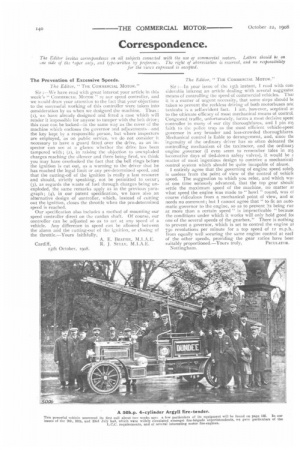Correspondence.
Page 14

If you've noticed an error in this article please click here to report it so we can fix it.
The Editor invites correspondence on all subjects connected with the use of commercial motors. Letters should foe ox
une side of th.1 kaper only, and type-written by preferenc:. The right of abbreviation is reserved, and no responsibility for the views expressed is accepted.
The Prevention of Excessive Speeds.
The Editor, 2' THE COMMERCIAL MOTOR."
Sir :—We have read with great interest your article in this week's " COMMERCIAL MOTOR " re Out speed controller, and we would draw your attention to the fact that your objections to the successful working of this controller were taken into consideration by us when we designed the machine. Thus; (1), we have already designed and fitted a case which will render it impossible for anyone to tamper with the belt drive; this case Call be locked—in the same way as the cover of the machine which encloses the governor and adjustmentsand the key kept by a responsible person, but where inspectors are employed, as on public service, we do not consider it necessary to have a guard fitted over the drive, as an inspector can see at a glance whether the drive has been tampered with; (2), in raising the objection to unexploded charges reaching the silencer and there being fired, we think you may have overlooked the fact that the bell rings before the ignition is cut out, as a warning to the driver that he has reached the legal limit or any pre-determined speed, and that the cutting-off of the ignition is really a last resource and should, strictly speaking, not be permitted to occur; (3), as regards the waste of fuel through charges being unexploded, the same remarks apply as in the previous paragraph; (4), in our patent specification, we have also an alternative design of controller, which, instead of cutting out the ignition, closes the throttle when the pre-determined speed is reached.
Our specification also includes a method of mounting our speed controller direct on the cardan shaft. Of course, our controller can be adjusted so as to act at any speed of a vehicle. Any difference in speed can be allowed between the alarm and the cutting-out of the ignition, or closing of the throttle.—Yours faithfully, A. F. BEATTIE, M.1.A.E.
Cardiff, R. J. SULLY, M.1.A.E, 15th October, 1908. The Editor, "THE COMMERCIAL Maros."
Sir :—In your issue of the 15111 instant, I read with con siderable interest an article dealing with several sug-gestee means of controlling the speed of commercial vehicles. Thai it is a matter of urgent necessity, that some steps should lx taken to prevent the reckless driving of both motorbuses and taxicabs is a self-evident fact. I am, however, sceptical at to the ultimate efficacy of most mechanical means of control Congested traffic, unfortunately, forms a most decisive speed controller in many of our city thoroughfares, and I pin my faith to the police trap as the most efficient vehicle-speed governor in any broader and less-crowded thoroughfares. Mechanical control is liable to derangement, and, since tht ingenuity of the ordinary driver has so often defeated tht controlling mechanism of the taximeter, and the ordinary engine governor (I even seem to remember tales in my ltx:omotive days of tied-down safety valves), it would be a matter of most ingenious design to contrive a mechanical. control system which should be quite incapable of abuse. I entirely agree that the governing of engine speed solely is useless from the point of view of the control of vehielt speed. The suggestion to which you refer, and which wat at one time seriously advanced, that the top gear should settle the maximum speed of the machine, no matter at what speed the engine was made to " howl " round, was of course ridiculous from a mechanical point of view, and Sc needs no comment; but I cannot agree that "to fit an auto. matic governor to the engine, so as to prevent Its being run at more than a certain speed " is impracticable " because the conditions under which it works will only hold good fot one of the several speeds of the gearbox." There is nothing to prevent a governor, which is set to control the engine al 750 revolutions per minute for a top speed of 12 m.p.h., from equally well securing the same engine control at eact of the other speeds, providing the gear ratios have been suitably proportioned.—Yours truly, PECULATOR. Nottingham.




















